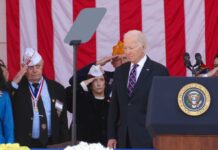
Chevron Deference faces its first real challenges in years at the hands of two cases brought by New England Fishermen.
Amid a historic and record-setting win in Iowa by Donald J. Trump, one of the most important Supreme Court decisions in the past decade has been widely ignored. The decision of the Court in Chevron U.S.A., Inc. v. Natural Resources Defense Council, Inc. (1984), shaped the importance of regulatory agencies in the decades following. That 40-year reign of unrestricted regulatory rule for Federal agencies may be ending due to two cases being heard by SCOTUS today.
To begin, however, what is Chevron Deference? The Court held that federal agencies, in the case of Chevron it was the Environmental Protection Agency (EPA), had the right to interpret the roles Congress gave them in the event of an ambiguity in the directions Congress gave them. In the words of Justice John Paul Stevens, who penned the unanimous decision,
When a challenge to an agency construction of a statutory provision, fairly conceptualized, really centers on the wisdom of the agency’s policy, rather than whether it is a reasonable choice within a gap left open by Congress, the challenge must fail. In such a case, federal judges-who have no constituency-have a duty to respect legitimate policy choices made by those who do. The responsibilities for assessing the wisdom of such policy choices and resolving the struggle between competing views of the public interest are not judicial ones: “Our Constitution vests such responsibilities in the political branches.” TVA v. Hill, 437 U. S. 153, 195 (1978).
Essentially, the Chevron doctrine emphasizes the principle that judicial bodies should defer to administrative agencies’ interpretations of ambiguous laws, provided these interpretations are reasonable. This approach gives agencies leeway, or deference as the name implies, in legal matters not explicitly addressed by Congress, recognizing their expertise and Congress’s implicit trust in their judgment.
Although this may seem innocuous enough, there are serious problems with what this doctrine has allowed for over the past four decades. One of the first and most pressing matters raised by the Court’s decision in Chevron is its seemingly contradictory position to the Administrative Procedure Act (APA) of 1946 since the APA “requires courts to determine independently all relevant questions of law”—“including the interpretation of constitutional or statutory provisions.” This specification was made by Rep. Francis E. Walter, Chairman of the House Subcommittee on Administrative Law.
These two ideas stand in direct opposition to one another, following Chevron however, the APA quickly faded into irrelevancy as these Federal Agencies chose to make decisions with the wide swath of interpretation afforded to them by the 1984 ruling. This ability to regulate with impunity has led to the drastic rise in red tape that has burdened American entrepreneurs for so long now. Over-regulation was so important that it was a central promise in Donald Trump’s first presidential campaign platform, which he delivered on, leading to the saving of $220 billion in regulatory costs.
As Joseph Postell and Paul J. Larkin, Jr. for the Heritage Foundation wrote,
The Chevron and Auer deference doctrines raise serious constitutional concerns, are inconsistent with the Administrative Procedure Act, and have little basis in American legal history. They threaten to disrupt the separation of powers by transferring judicial power to executive officials under the fictional presumption that Congress intends to give administrative agencies power to interpret the law whenever it creates a statutory gap. Judges do not apply the Chevron framework consistently, and this leads to confusion about the level of deference that agencies actually receive in practice.
For these reasons, it is time for the misguided deference regime to end.
All this goes to demonstrate both a theoretical and tangible need for the Court to overturn the Chevron doctrine once and for all. That brings us to the two cases on the docket for today, Loper Bright Enterprises v. Raimondo & Relentless, Inc. v. Department of Commerce. Both of these deal with the question of the Chevron doctrine, are brought by those engaged in the Herring fishing industry in New England, against the National Marine Fisheries Service (NMFS), and question the Magnuson-Stevens Fishery Conservation and Management Act (MSA).
There is a lot of overlap between these two cases, which is why the Court will be hearing them on the same day. The specific overstep, the petitioners claim, was the NMFS forcing individual privately owned ships, or their parent companies, to take aboard, and financially support, the cost of at-sea monitoring. In the document published by the Court notifying the parties that certiorari had been granted in the case of Restless, Inc v. Department of Commerce, the Court wrote,
Deeming annual Congressional appropriations for the federal observers insufficient, the agency asserted a right to force the fishing vessels into contracts to pay the federal observers. The First Circuit approved this practice without stating whether its conclusion was a “product of Chevron step one or step two.” It held the mere fact that the MSA provides for federal observers gave the agency carte blanche to charge the regulated party for those observers. Neither Chevron nor the MSA provision allowing measures “necessary and appropriate” to enforce the statute allows this result.
If allowed to stand, these increased costs will either put the fishermen out of work due to increased costs, or they will be forced to push those costs onto the consumer. The misuse of Chevron deference by current and previous administrations is evident in the way federal regulatory agencies have been able to impose restrictions, enact regulations, and subsequently levy financial penalties on businesses for the inconvenience.
As the Court hears arguments today in both these cases, we have to hope that when their decision comes out later this year, it will reverse the 40 years of unchecked government red-tape. De-regulation is one of the best ways to boost the American economy in a time when it is struggling, and SCOTUS can take a big leap in that direction with this decision.
Stoic American is a Content Contributor at Turley Talks.
Copyright, 2024. TurleyTalks.com



















